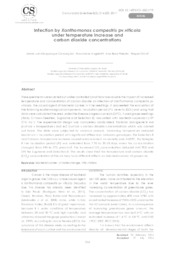Infection by Xanthomonas campestris pv.viticola under temperature increase and carbon dioxide concentrations.
Infection by Xanthomonas campestris pv.viticola under temperature increase and carbon dioxide concentrations.
Author(s): CONCEIÇÃO, J. L. A.; ANGELOTTI, F.; PEIXOTO, A. R.; GHINI, R.
Summary: The experiments were carried out under controlled conditions to evaluate the impact of increased temperature and concentration of carbon dioxide on infection of Xanthomonas campestris pv viticola, the causal agent of bacterial canker in Vine seedlings. It proceeded the evaluation of the following epidemiological components: incubation period (PI), severity (SEV) and using that data were calculated the area under the disease progress curve (AUDPC). It used grape seedlings (Italia, Crimson Seedless, Sugraone and Selection 8) inoculated with bacterial suspension (108 CFU mL-1). The experimental design was completely randomized, factorial arrangement 4x4 (cultivar x temperature) and 4x2 (cultivar x carbon dioxide concentration) which was carried out twice. The data were subjected to variance analysis. Increasing temperature reduced bacterium?s incubation period with significant differences between genotypes. For Selection 8 and Crimson temperature increase caused enhancement on severity and AUDPC. For Seleção 8 the incubation period (PI) was extended from 7.93 to 30.18 days when the concentration changed from 390 to 770 μmol/mol. The increased CO2 concentration reduced AACPSD and SEV for Sugraone and Selection 8. The results show that the temperature and carbon dioxide (CO2) concentration of the air may have different effects on bacterial canker of grapevine.
Publication year: 2017
Types of publication: Journal article
Unit: Embrapa Semi-arid Region
Observation
Some of Embrapa's publications are published as ePub files. To read them, use or download one of the following free software options to your computer or mobile device. Android: Google Play Books; IOS: iBooks; Windows and Linux: Calibre.
Access other publications
Access the Agricultural Research Database (BDPA) to consult Embrapa's full library collection and records.
Visit Embrapa Bookstore to purchase books and other publications sold by Embrapa.

